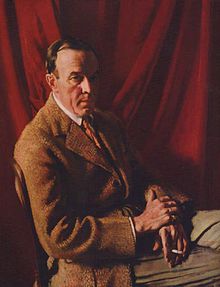Stephen Carlton Clark
| Stephen Carlton Clark | |
|---|---|

Stephen Calton Clark (c.1921) by William Orpen
|
|
| Born | August 29, 1882 Cooperstown, New York, United States |
| Died | September 17, 1960 New York City, United States |
| Residence | New York City, Cooperstown, New York |
| Education |
Yale University Columbia Law School |
| Occupation | Businessman, newspaper publisher |
| Known for | Founder: Baseball Hall of Fame |
| Political party | Republican Party |
| Board member of |
Singer Sewing Machine Co., Baseball Hall of Fame, Museum of Modern Art, New York State Historical Association, Metropolitan Museum of Art, New York Trust Company, Roosevelt Hospital |
| Spouse(s) | Susan Vanderpoel Hun |
| Children | Elizabeth Clark Labouisse Stephen Carlton Clark, Jr. Peter Gansevoort Clark Alfred Corning Clark Robert Vanderpoel Clark |
| Parent(s) |
Alfred Corning Clark & Elizabeth Scriven |
| Relatives |
Edward Severin Clark (brother) Robert Sterling Clark (brother) F. Ambrose Clark (brother) Jane Forbes Clark (granddaughter) Anne Farnsworth Peretz (granddaughter) |
Stephen Carlton Clark (August 29, 1882 – September 17, 1960) was an American art collector, businessman, newspaper publisher and philanthropist. He founded the Baseball Hall of Fame in Cooperstown, New York.
Clark was the youngest of the four sons of Alfred Corning Clark and Elizabeth Scriven. His grandfather, Edward Cabot Clark, a lawyer, had been Isaac Singer's partner in the Singer Sewing Machine Company. His father invested heavily in New York City real estate, and died in April 1896, leaving a $30,000,000 family trust.
He was educated at Phillips Academy (Andover), Yale University (B.A. 1903) and Columbia Law School (1907), and became a director of the Singer Manufacturing Company. He and his brother Edward built the Otesaga Hotel in Cooperstown in 1909. That same year, he was elected to the New York State Assembly as a Republican from Otsego County (133rd New York State Legislature). He served in the U.S. Army during World War I, attaining the rank of lieutenant-colonel, and was awarded the Distinguished Service Medal. He was the owner and publisher of three Albany, New York newspapers in the 1920s.
Clark established cultural institutions in his home town of Cooperstown. He founded the Baseball Hall of Fame and paid for construction of its building, which opened in 1939. He offered his late brother Edward's country estate to the New York State Historical Association, which moved its headquarters to Cooperstown in 1939. The estate's mansion houses the Fenimore Art Museum, whose collection of American paintings and folk art Clark greatly expanded in the 1940s and 1950s. Clark founded the Farmers' Museum in 1942, which features a large collection of farm tools and equipment housed in Edward's former dairy barn. Its attractions include a village of relocated 19th-century buildings staffed by interpreters in vintage costume, including a blacksmith's forge, and a working carousel. The museums are across New York State Route 80 from each other, on land once owned by James Fenimore Cooper.
...
Wikipedia
